牛津译林版七年级英语下册Unit 7 Abilities 必考知识点归纳及练习
文档属性
| 名称 | 牛津译林版七年级英语下册Unit 7 Abilities 必考知识点归纳及练习 | 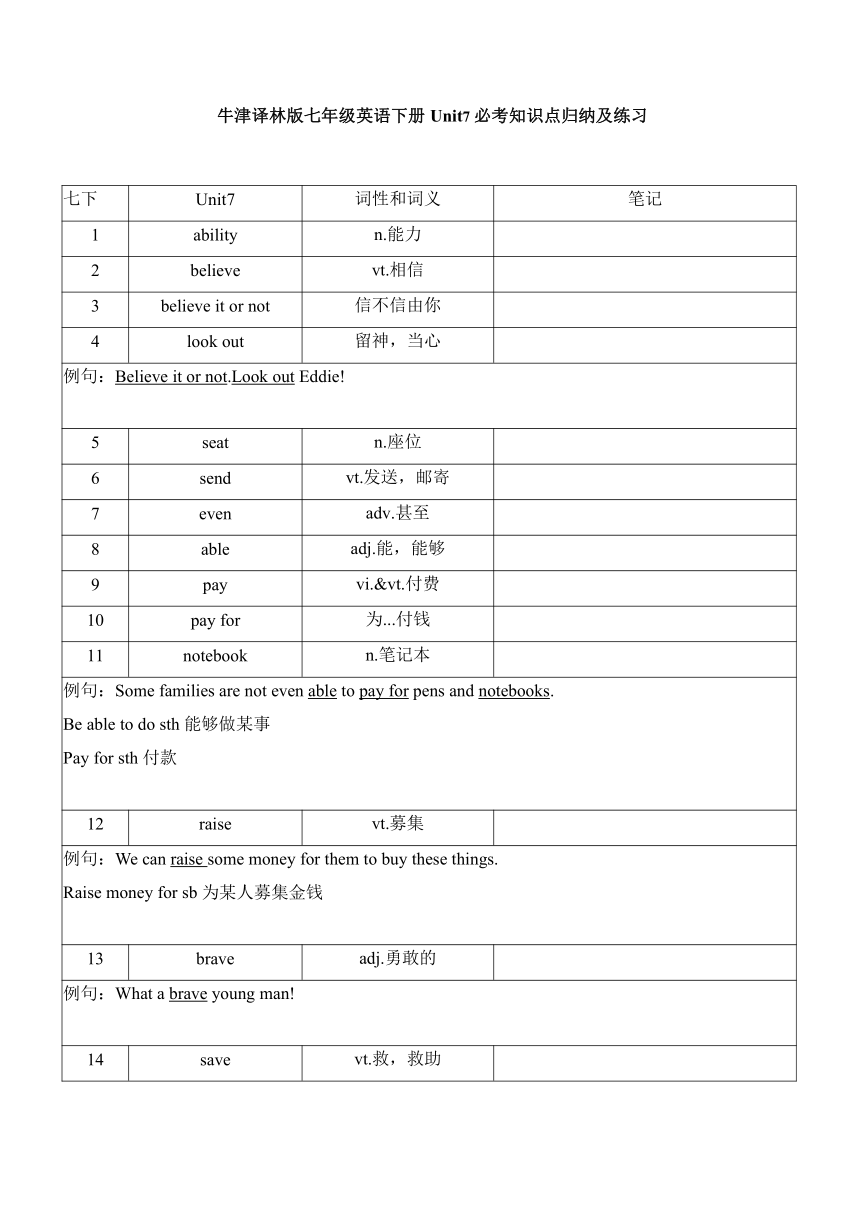 | |
| 格式 | doc | ||
| 文件大小 | 163.0KB | ||
| 资源类型 | 教案 | ||
| 版本资源 | 牛津译林版 | ||
| 科目 | 英语 | ||
| 更新时间 | 2021-05-28 09:53:27 | ||
图片预览

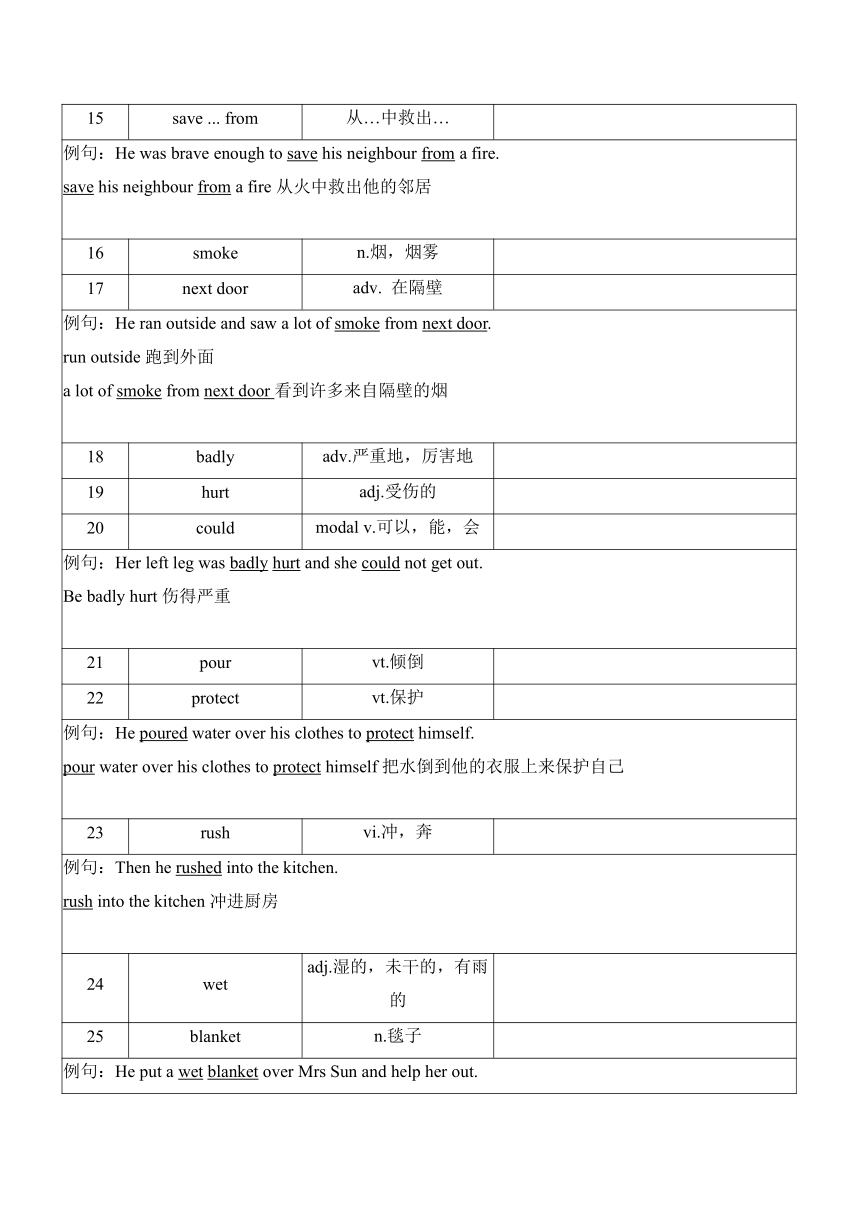
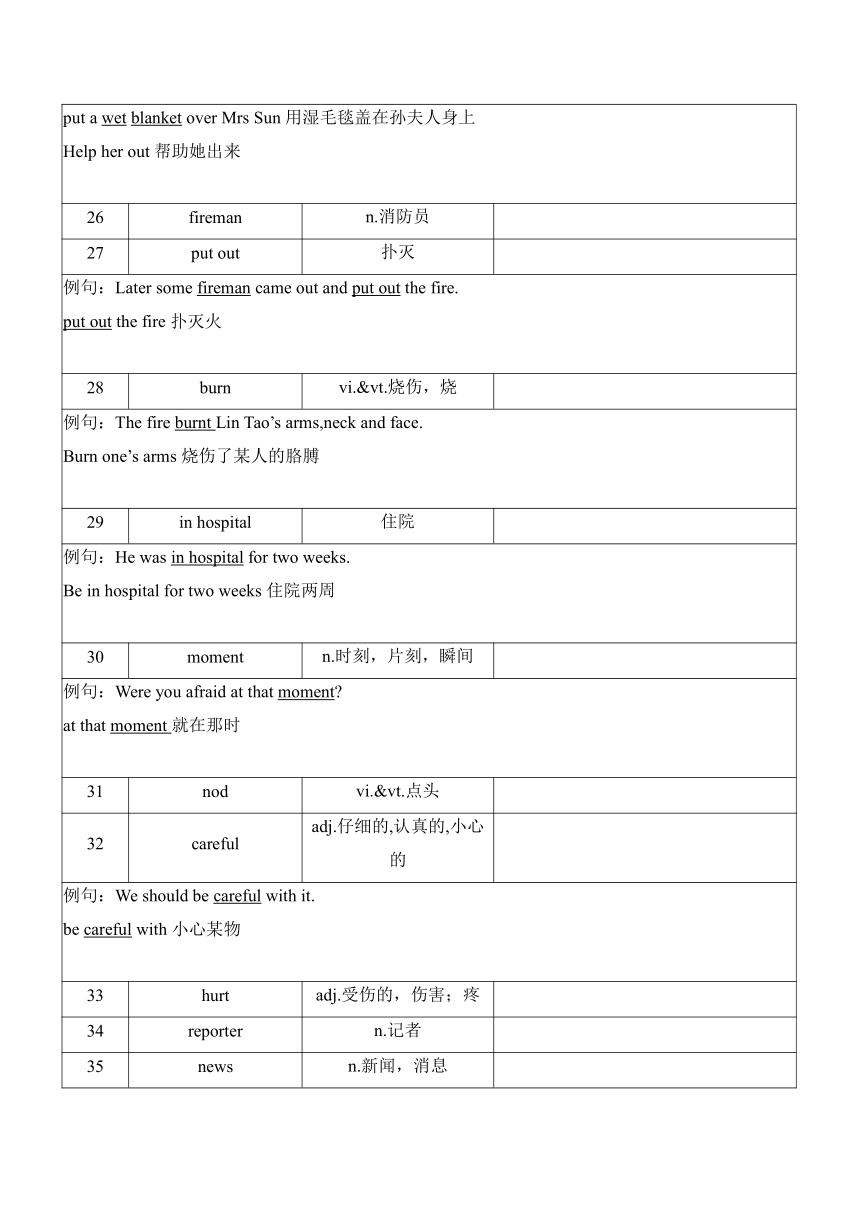
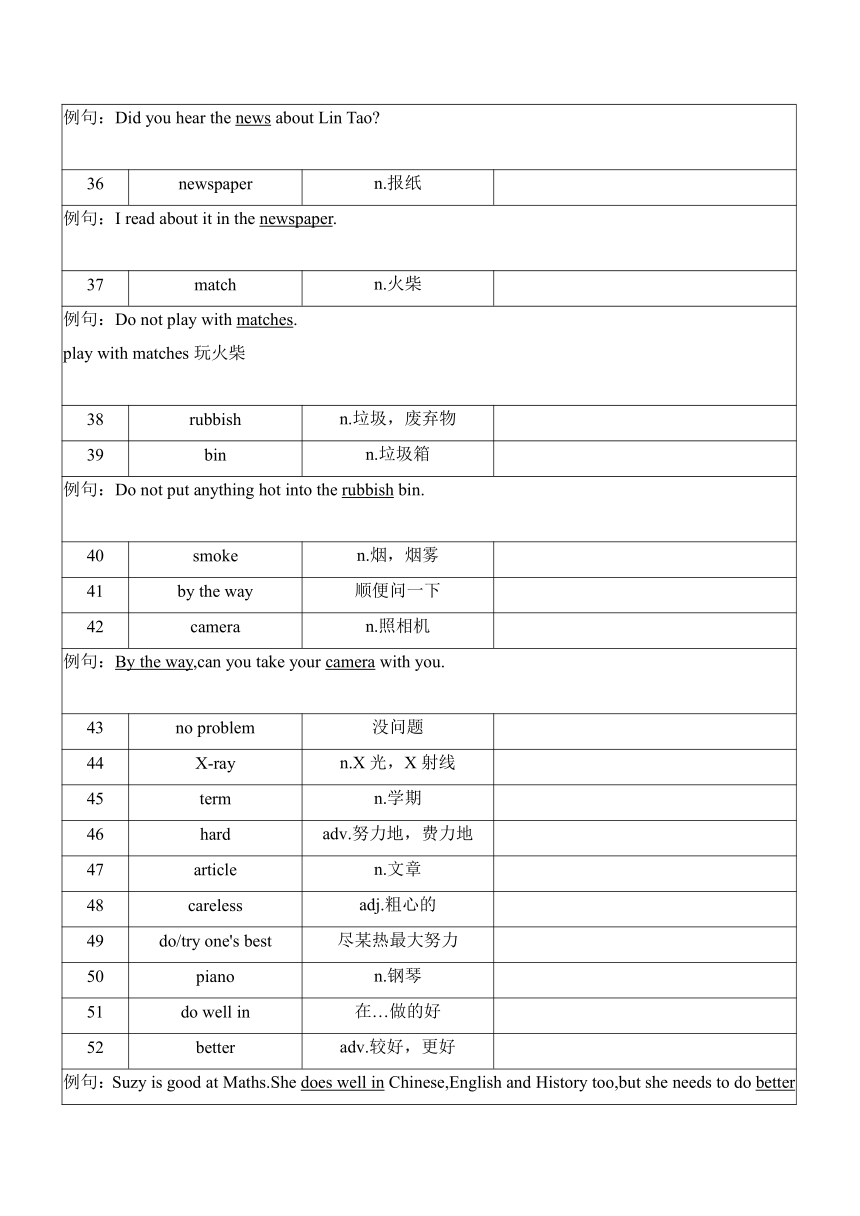
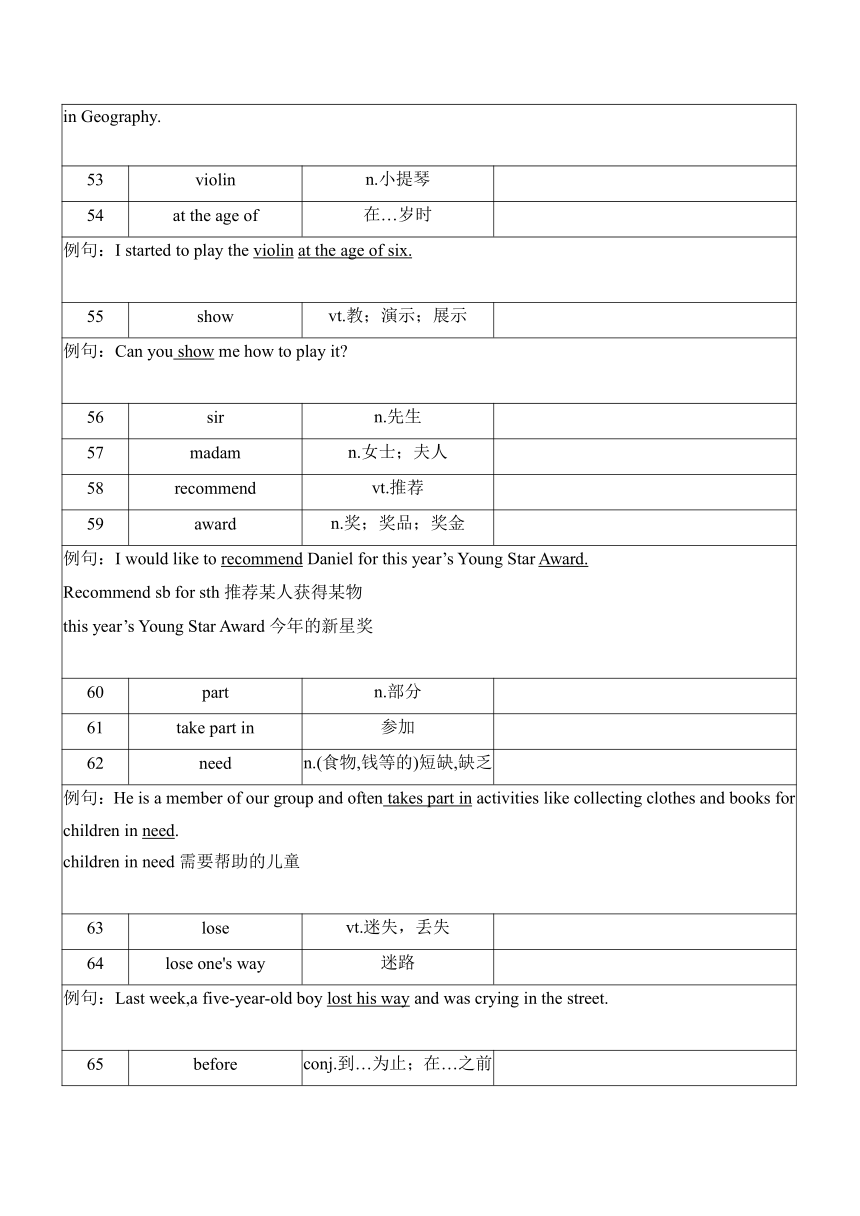
文档简介
牛津译林版七年级英语下册Unit7必考知识点归纳及练习
七下 Unit7 词性和词义 笔记
1 ability n.能力
2 believe vt.相信
3 believe it or not 信不信由你
4 look out 留神,当心
例句:Believe it or not.Look out Eddie!
5 seat n.座位
6 send vt.发送,邮寄
7 even adv.甚至
8 able adj.能,能够
9 pay vi.&vt.付费
10 pay for 为...付钱
11 notebook n.笔记本
例句:Some families are not even able to pay for pens and notebooks. Be able to do sth能够做某事
Pay for sth付款
12 raise vt.募集
例句:We can raise some money for them to buy these things. Raise money for sb为某人募集金钱
13 brave adj.勇敢的
例句:What a brave young man!
14 save vt.救,救助
15 save ... from 从…中救出…
例句:He was brave enough to save his neighbour from a fire. save his neighbour from a fire从火中救出他的邻居
16 smoke n.烟,烟雾
17 next door adv. 在隔壁
例句:He ran outside and saw a lot of smoke from next door. run outside跑到外面
a lot of smoke from next door看到许多来自隔壁的烟
18 badly adv.严重地,厉害地
19 hurt adj.受伤的
20 could modal v.可以,能,会
例句:Her left leg was badly hurt and she could not get out. Be badly hurt伤得严重
21 pour vt.倾倒
22 protect vt.保护
例句:He poured water over his clothes to protect himself. pour water over his clothes to protect himself把水倒到他的衣服上来保护自己
23 rush vi.冲,奔
例句:Then he rushed into the kitchen. rush into the kitchen冲进厨房
24 wet adj.湿的,未干的,有雨的
25 blanket n.毯子
例句:He put a wet blanket over Mrs Sun and help her out. put a wet blanket over Mrs Sun用湿毛毯盖在孙夫人身上
Help her out帮助她出来
26 fireman n.消防员
27 put out 扑灭
例句:Later some fireman came out and put out the fire. put out the fire扑灭火
28 burn vi.&vt.烧伤,烧
例句:The fire burnt Lin Tao’s arms,neck and face. Burn one’s arms烧伤了某人的胳膊
29 in hospital 住院
例句:He was in hospital for two weeks. Be in hospital for two weeks住院两周
30 moment n.时刻,片刻,瞬间
例句:Were you afraid at that moment? at that moment就在那时
31 nod vi.&vt.点头
32 careful adj.仔细的,认真的,小心的
例句:We should be careful with it. be careful with小心某物
33 hurt adj.受伤的,伤害;疼
34 reporter n.记者
35 news n.新闻,消息
例句:Did you hear the news about Lin Tao?
36 newspaper n.报纸
例句:I read about it in the newspaper.
37 match n.火柴
例句:Do not play with matches. play with matches玩火柴
38 rubbish n.垃圾,废弃物
39 bin n.垃圾箱
例句:Do not put anything hot into the rubbish bin.
40 smoke n.烟,烟雾
41 by the way 顺便问一下
42 camera n.照相机
例句:By the way,can you take your camera with you.
43 no problem 没问题
44 X-ray n.X光,X射线
45 term n.学期
46 hard adv.努力地,费力地
47 article n.文章
48 careless adj.粗心的
49 do/try one's best 尽某热最大努力
50 piano n.钢琴
51 do well in 在…做的好
52 better adv.较好,更好
例句:Suzy is good at Maths.She does well in Chinese,English and History too,but she needs to do better in Geography.
53 violin n.小提琴
54 at the age of 在…岁时
例句:I started to play the violin at the age of six.
55 show vt.教;演示;展示
例句:Can you show me how to play it?
56 sir n.先生
57 madam n.女士;夫人
58 recommend vt.推荐
59 award n.奖;奖品;奖金
例句:I would like to recommend Daniel for this year’s Young Star Award. Recommend sb for sth推荐某人获得某物
this year’s Young Star Award今年的新星奖
60 part n.部分
61 take part in 参加
62 need n.(食物,钱等的)短缺,缺乏
例句:He is a member of our group and often takes part in activities like collecting clothes and books for children in need. children in need需要帮助的儿童
63 lose vt.迷失,丢失
64 lose one's way 迷路
例句:Last week,a five-year-old boy lost his way and was crying in the street.
65 before conj.到…为止;在…之前
66 hear from 收到…的来信
例句:We look forward to hearing from you soon.
67 yours faithbully (书信结尾签名前)您忠实的
They need clothes and shoes most.We can send some to them. need sth most最需要某物
Send sth to sb把某物寄送给某人
On 10 may,Lin Tao was at home alone.
Be at home alone独自一人在家
Suddenly,he heard someone shouting.
hear someone shouting听见有人大喊
There was heavy smoke and the fire was very hot.
heavy smoke浓烟
I don’t have time to think about it.
have time to有时间干某事
He found out that his neighbour’s bathroom was on fire.
Be on fire着火
Is he getting better now?
Get better变得更好
Keep your hair away from fire.
Keep sb away from sth使某人远离某物
Can make a call on your mobile?I left mine at home.
make a call on your mobile用你的手机打个电话
Leave sth at home把某物落在家里
Superman can see through walls.
see through walls看透墙
He can also burn things with his eyes.
burn things with his eyes用他的眼睛烧东西
He can hear things far away.
hear things far away听到远处的东西
He can stop a train with his hands.
stop a train with his hands用手拦停火车
He can fly as fast as light.
fly as fast as light飞得像光一样快
He does not do her best this term.
Do one’s best尽某人最大努力
【词汇精讲】
1. can/ could/ may
(1) can是最常用的情态动词,其后接动词原形,没有人称和数的变化,其否定形式为can’t。can可以表示能力,表示现在的能力时用can, 表示过去的能力时用could,could的否定式是couldn’t。例如:
I can run fast. 我能跑得快。
She can speak Japanese. 她会说日语。
He could ride a bike when he was six. 他六岁时就会骑自行车。
【注意】be able to 也可以表能力,can在表示“能力”时可与be able to互换使用,be able to 有更多的时态,常被用来表示can所不能表示的将来时或完成时。例如:
They will be able to run the machine on their own in three months.
三个月后,他们能自己操作这台机器。
(2)can/could/may可以表示请求和许可。could比can语气更加的委婉,更有礼貌。may比较正式。例如:
Can I read your newspaper? 我可以看一下你的报纸吗?
You can put your bike here. 你可以把自行车放在这里。
Could you lend me your bike? 你能把自行车借给我吗?
May I use your computer? 我可以用一你的电脑吗?
(3)can/could/may可以谈论可能性。
She may go to the fashion show on Sunday.??
星期天她可能要去参加时装展。
Fire can be dangerous if we are not careful.?
如果我们不小心,火可能是危险的。
??? It was snowing in Canada. We could go skiing there.
加拿大在下雪,我们可以在那里滑雪。
2. look out
(1)look out 意为“留神,当心,小心”,多用于口语中,用来提醒人们注意当前的危险状态或不安全的场所及事物。相当于take care/ be careful, 常常单独使用。例如:
Look out! There is danger ahead. 当心!前面有危险。
Look out! The water is too deep. 当心!水太深了。
Look out!/Take care!/ Be careful! There is a car coming. 当心!来了一辆汽车。
(2)look out后接其它介词时,要带宾语。常见的有:look out at 意为“向外看……“;
look out of 意为“朝……外看”。例如:
We look out at the beach and the sea. 我们朝外看沙滩和大海。
Don’t look out of the window. 不要朝窗外看。
3. take part in
take part in和join,join in都有参加的意思。具体用法如下:
(1)take part in指参加群众性的活动、会议、劳动、游行等,往往指参加者持有积极的态度,起一定作用,有时与join in互换。例如:
I didn’t take part in the sports meeting yesterday because I was ill.
我没有参加昨天的运动会,因为我病了。
(2)join指加入某党派、某组织或某社会团体,以及参军等,并成为其中一员。例如:
I joined the army in 1996. 我是1996年参军的。
(3)join in指参加某项比赛或活动,常用于口语中,也可用于join sb. in (doing) sth. 意为“加入……(做)……”。例如:
May I join in the football match? 我可以参加这场足球比赛吗?
4. lose (one’s way)
lose 动词,意为“迷失,丢失”。lose one’s way意为“迷路”,相当于get lost;lose one’s home 意为“失去家园”。例如:
The boy got lost. = The boy lost his way. 那个男孩迷路了。
The flood made thousands of people lose their homes.
洪水使成千上万的人失去了家园。
【拓展】
lost 是lose的形容词, 意为“走失的,迷路的,失散的”或者“丢失的,遗失的”;常与系动词be或者get连用,表示“丢失,走失,迷路”,也经常用于名词前作定语修饰名词。例如:
My keys are lost again. 我的钥匙又丢了。
a lost child 走丢了的孩子 a lost watch 被人遗失的手表
5. do well in
do well in 意为“…做得好”,后接名词、代词或v-ing形式。be good at 是do well in 的同意词组,在句子中常可以互换。它们的反义词组是be poor at / be weak in 意为“在……方面差”。例如:
She is good at Chinese. = She does well in Chinese. 她擅长语文。
He is poor at (weak in) math. 他数学学得不好。
6. try / do one’s best
try one’s best意为“尽某人最大努力做某事”,相当于do one’s best。例如:
We should try / do our best to work. 我们应该尽最大努力去工作。
【拓展】常见的由try构成的其它词组:
try (not) to do sth. 努力(不)做某事 try doing sth. 尝试做某事
try out实验 try on试穿(鞋、衣服等)
例如:
I try to answer the question. 我尽力回答这个问题。
He tried swimming across the river. 他试着游过河去。
She is trying on a new dress. 她正在试穿一件新连衣裙。
7. smoke
(1)smoke 作名词,意为“烟,烟雾”。例如:
I open the window to let the smoke out. 我打开窗户让烟出去。
There is smoke without fire. 无风不起浪。
(2)smoke作动词,意为“吸烟,冒烟”。例如:
After class, he went out to smoke a cigarette.下课后,他出去抽了支烟。
The fireplace smokes badly. 这壁炉冒烟太多。
8. put out
put out 是一个及物动词短语,意为“扑灭,熄灭”。例如:
Far water does not put out near fire. 远水救不了近火。
It’s too dark. Don’t put out the light. 天太黑了,不要把灯火熄灭。
【拓展】常见的其他和put相关的词组:
put on 穿上 put down 把……放下,记下
put away 把……收好 put up 挂起,举起 put off 推迟,延期
例如:
Put your coat on, please. 请把外套穿上。
The bus put down some passengers. 几位乘客下了公共汽车。
Never put off till tomorrow what you can do today. 今日事今日毕。
Put your toys away. 把你的玩具收好。
Put up your hands, please. 请举手。
9. seat
seat作名词,意为“座位”,作动词时是及物动词,意为“坐下,使就座”。例如:
Are there enough seats for everyone? 座位够吗?
I seated myself at my desk. 我在书桌旁坐下。
【拓展】sit和seat的辨析:
二者均可表示“坐”,sit是不及物动词,主语是人;seat是及物动词,主语是人时,表示“使……坐下”,宾语常是反身代词;主语是处所时,表示“能坐多少人”。例如:
She sits alone in her room. 她独自坐在房间里。
Our classroom can seat fifty students. 我们教室能坐50个学生。
10. hurt
(1)hurt 作动词,意为“使受伤,伤害,疼”,其过去式为hurt。例如:
My head hurts. 我头痛。
He fell off the truck and hurt his leg. 他从卡车上掉下来,伤了腿。
(2)hurt可以作形容词,意为“受伤的”。例如:
This man needs a doctor, he’s badly hurt. 这个人需要看医生,他伤的很严重。
(3)hurt还可以作名词,意为“伤害”。例如:
This failure is a great hurt to me. 这次失败对我来说是很大的伤害。
【句式精讲】
1. We can send some to them.
send是及物动词,意为“寄,发送”,过去式和过去分词都是sent,其后能接双宾语,即send sb. sth.=send sth. to sb.意为“送给(寄给)某人某物,动词send后可接双宾语。例如:
He sent me a postcard. = He sent a postcard to me. 他寄给我一张明信片。
【拓展】
动词接双宾语时,有两种结构:
(1)动词 + 间接宾语(sb.) + 直接宾语(sth.)
(2)动词 + 直接宾语(sth.) + 介词(for/to) + 间接宾语(sb.)
能接双宾语的动词可分为两类:
(1)常用介词to的动词有:send; give; show; bring; show; teach; tell等。例如:
give sb. sth. = give sth. to sb. show sb. sth. = show sth. to sb.
(2)常用介词for的动词有:buy; sing; make; cook; get等。例如:
buy sb. sth. = buy sth. for sb. make sb. sth. = make sth. for sb.
2. He is brave enough to save a neighbour from a fire.
save意为“保存、储存、挽救、节省”等意思。save…from…意为
“从……中救出……”。save one’s life 意为“救某人的命, 帮某人大忙”。例如:
The man saved a boy from the river yesterday. 昨天那个人从河中救出了一个男孩。
He saved the boy’s life. 他救了那个男孩的命。
How do you save the document? 你如何保存这个文件?
The boy saves money to buy a pen. 那个男孩攒钱买钢笔。
The police saved the girl’s life. 警察救了那个女孩的命。
3. Some families are not able to pay for pens and notebooks.
pay…for意为“为……付款”,在句中常见的结构形式有:
(1)pay sb. money for sth. 意为“付钱(给某人)买……。例如:
I have to pay them 20 pounds for this room each month.
我每个月要付给他们20英镑的房租。
(2)pay for sth. 付……的钱。例如:
I have to pay for the lost book. 我不得不赔丢失的书款。
(3)pay for sb. 意为“替某人付钱”。例如:
They pay us every month. 他们每个月给我们报酬。
4. What…和How…引导的感叹句
感叹句是用来表达喜怒哀乐等强烈情感的句子。感叹句一般用how或者what开头,句末加感叹号。what修饰名词,how修饰形容词或副词。具体句式如下:
(1)what引导的感叹句:
1)What a(an)+形容词+可数名词的单数形式+主语+谓语!
What a clever boy he is!多么聪明的小男孩啊!
2)What+形容词+可数名词的复数形式+主语+谓语!
What interesting books the children are reading!
孩子们读的书多么有趣啊!
3)What+形容词+不可数名词+主语+谓语!
What cold weather it is! 多冷的天!
(2)how引导的感叹句:
1)How+形容词或副词+主语+谓语!
How lovely the baby is! 这孩子真可爱!(lovely为形容词)
How fast he runs! 他跑地多快啊!(fast为副词)
2) How+形容词+a(an)+可数名词的单数形式+主语+谓语!
How heavy a box they are carrying! 他们抬的箱子多重啊!
3)How+主语+谓语!
How time flies! 时间过得多快!
5. hear sb. doing sth.
(1)hear sb. doing sth. 意为“听到某人正在做某事”,表示动作正在发生或进行。例如:
? Can you hear him singing in the room? 你听到他正在房间里唱歌吗?
When I was walking on the road, heard a girl shouting.
当我正走在路上时,听见了一个女孩在喊。
? (2)hear sb. do sth.意为“听见某人做某事”,通常是指听到的全过程或者强调某事经常发生。例如:
? Let’s hear him sing a song for us.? 让我们听他为我们唱首歌。
We often heard him sing the song last year. 去年我们经常听他唱这首歌。
【拓展】除hear外,其他感官动词,如look(看),see(看到),notice(注意到),watch(看),listen(听)等,也有类似用法,即表示习惯性动作时,后接动词原形作宾补; 表示正在进行的动作时,后接-ing形式作宾补。例如:
I saw Li Ming playing near the river on my way home.
在我回家路上,我看见李明正在河边玩。
She watched the children play table tennis. 她看孩子们打乒乓球。
I noticed the man leaving the house. 我注意到那人离开这栋房子。
【聚焦中考】:Unit7 必考知识点汇编 考点一:考查有关look的词组辨析
Look out, Eddie!当心,埃迪!(教材第80页)
中考链接
Can you help me to _____ my dog when I leave for Hong Kong?
A. look after B. look for C. look at D. look through
【答案】A
【解析】本题考查短语辨析。look after意为“照顾,照料”,look for意为“寻找”,look at意为“看……”,look through意为“浏览”。根据句意“当我离开去香港时,你能帮我照看我的狗吗?”可知,故选A。
考点二:考查有关give词组辨析
giving a seat to someone on the bus (教材第81页)
中考链接
Andrea Bocelli never _____, which makes him a successful singer.
A. takes away B. gives away C. gets up D. gives up
【答案】D
【解析】本题考查动词短语辨析。take away意为“拿走,带走”,give away意为“分发”,get up意为“起床”,give up意为“放弃”。根据句意“安德烈?波切利从未放弃,这使他成为一名成功的歌手”可知,故选D。
考点三:考查复合形容词的用法
He went in and found his neighbour, the 79-year-old Mrs Sun, in the kitchen.
他走进去,发现他的邻居,79岁的孙夫人在厨房里。
(教材第82页)
中考链接
一How far is it from Tianjin to Changsha?
—It is a ______ flight from Tianjin to Changsha.
A. 2-hour-long B. 2-hours-long C. 2 hours’ long D. 2 hour long
【答案】A
【解析】本题考查复合形容词的用法。复合形容词中间应用连词符连接,名词应用单数形式,故选A。
考点四:考查不定代词的用法
Do not put anything hot into the rubbish bin.
不要把任何热的东西放进垃圾箱。(教材第84页)
中考链接
I’ve been so bored for a long time. I hope to have ____to do.
A. exciting anything B. nothing exciting
C. something interesting D. good something
【答案】C
【解析】本题考查不定代词的用法。根据句意“我无聊很长时间了。我希望有一些有趣的事情可做。”可知,形容词修饰不定代词应放在不定代词之后,故选C。
考点五:动词leave的用法
I left mine at home.我把我的落家了。(教材第85页)
中考链接
—Show me your homework, Dave.
一Sorry, Mrs Brown. I’ve _______ it at home.
A. missed B. forgotten C. lost D. left
【答案】D
【解析】根据句意“戴夫,给我看看你的作业。”“对不起,布朗太太。我把它落家了。”可知,“把某物遗忘在家里”应用leave sth. at home,故选D。
考点六:感叹句的用法
What a brave man! 多么勇敢的人啊!(教材第85页)
1. (2014 ?佛山中考) _____ seriously ill the poor old monkey is!
A. How B. What a C. What
【答案】A
【解析】考查感叹句。句意为“那只可怜的老猴子病得多严重啊!”。how引导的感叹句结构为How + adj. / adv. +主+谓!,故选A。
—Jane Zhang is going to hold a concert here in July.
—Really? _______ exciting news!
A. How B. What an C. What
【答案】C
【解析】考查感叹句。英语中的感叹句有两种:一是由what引导的对名词进行的感叹句,其结构为“What (+a/an)+形容词+名词(+主语+谓语)!”;二是由how引导的对形容词或副词进行的感叹,其结构为“How+形容词/副词(+主语+谓语)!”。此处是对不可数名词news进行的感叹,所以不需要用冠词,用What +形容词+名词(+主语+谓语)!句式,故选C。
考点七:动词need的用法
Good this term, but she needs to read more and speak more.
这学期很好,但是她需要多读书、多说。(教材第87页)
一Clark, your room is really in a mess. It needs ______.
—Sorry, mum. I’ll do it at once.
A. clean B. cleaned C. to clean D. to be cleaned
【答案】D
【解析】本题考查need的用法。人作主语时,常用sb. need(s) to do sth.句型,意为“某人需要做某事”;物作主语时,常用sth. need(s) doing sth.或sth. need(s) to be done.句型,意为“某物需要做某事”根据句意可知,故选D。
▲词组
be able to 能够
believe it or not
信不信由你
look out/be careful
留神,当心
give a seat to someone on the bus
在公交车上给某人让座
send sth to sb.=send sb sth
发送某物给某人
pay for sth
为某物付款
raise money for Project Hope
为希望工程募集资金
save his neighbour from a fire
从火中救出他的邻居
see a lot of smoke from next door
从隔壁看到很多烟
protect sb.from sth
保护某人免受某事/某物伤害
rush into the kitchen
冲进厨房
put out the fire
扑灭火
burn one's arms
烧伤某人的手臂
in hospital/in the hospital
住院/在医院里
be careful with...
对 小心,当心...
play with matches
玩火柴
ask for permission
请求许可
by the way
顺便问一下,顺便说说
no problem
没问题
do/try one's best
尽某人最大努力
at the age of
在...岁时
recommend sb.for an award
推荐某人获得奖项
lose one's way
迷路
hear from sb
收到的来信
yours faithfully
(用于书信结尾签名前)您忠实的
take part in
参加
七下 Unit7 词性和词义 笔记
1 ability n.能力
2 believe vt.相信
3 believe it or not 信不信由你
4 look out 留神,当心
例句:Believe it or not.Look out Eddie!
5 seat n.座位
6 send vt.发送,邮寄
7 even adv.甚至
8 able adj.能,能够
9 pay vi.&vt.付费
10 pay for 为...付钱
11 notebook n.笔记本
例句:Some families are not even able to pay for pens and notebooks. Be able to do sth能够做某事
Pay for sth付款
12 raise vt.募集
例句:We can raise some money for them to buy these things. Raise money for sb为某人募集金钱
13 brave adj.勇敢的
例句:What a brave young man!
14 save vt.救,救助
15 save ... from 从…中救出…
例句:He was brave enough to save his neighbour from a fire. save his neighbour from a fire从火中救出他的邻居
16 smoke n.烟,烟雾
17 next door adv. 在隔壁
例句:He ran outside and saw a lot of smoke from next door. run outside跑到外面
a lot of smoke from next door看到许多来自隔壁的烟
18 badly adv.严重地,厉害地
19 hurt adj.受伤的
20 could modal v.可以,能,会
例句:Her left leg was badly hurt and she could not get out. Be badly hurt伤得严重
21 pour vt.倾倒
22 protect vt.保护
例句:He poured water over his clothes to protect himself. pour water over his clothes to protect himself把水倒到他的衣服上来保护自己
23 rush vi.冲,奔
例句:Then he rushed into the kitchen. rush into the kitchen冲进厨房
24 wet adj.湿的,未干的,有雨的
25 blanket n.毯子
例句:He put a wet blanket over Mrs Sun and help her out. put a wet blanket over Mrs Sun用湿毛毯盖在孙夫人身上
Help her out帮助她出来
26 fireman n.消防员
27 put out 扑灭
例句:Later some fireman came out and put out the fire. put out the fire扑灭火
28 burn vi.&vt.烧伤,烧
例句:The fire burnt Lin Tao’s arms,neck and face. Burn one’s arms烧伤了某人的胳膊
29 in hospital 住院
例句:He was in hospital for two weeks. Be in hospital for two weeks住院两周
30 moment n.时刻,片刻,瞬间
例句:Were you afraid at that moment? at that moment就在那时
31 nod vi.&vt.点头
32 careful adj.仔细的,认真的,小心的
例句:We should be careful with it. be careful with小心某物
33 hurt adj.受伤的,伤害;疼
34 reporter n.记者
35 news n.新闻,消息
例句:Did you hear the news about Lin Tao?
36 newspaper n.报纸
例句:I read about it in the newspaper.
37 match n.火柴
例句:Do not play with matches. play with matches玩火柴
38 rubbish n.垃圾,废弃物
39 bin n.垃圾箱
例句:Do not put anything hot into the rubbish bin.
40 smoke n.烟,烟雾
41 by the way 顺便问一下
42 camera n.照相机
例句:By the way,can you take your camera with you.
43 no problem 没问题
44 X-ray n.X光,X射线
45 term n.学期
46 hard adv.努力地,费力地
47 article n.文章
48 careless adj.粗心的
49 do/try one's best 尽某热最大努力
50 piano n.钢琴
51 do well in 在…做的好
52 better adv.较好,更好
例句:Suzy is good at Maths.She does well in Chinese,English and History too,but she needs to do better in Geography.
53 violin n.小提琴
54 at the age of 在…岁时
例句:I started to play the violin at the age of six.
55 show vt.教;演示;展示
例句:Can you show me how to play it?
56 sir n.先生
57 madam n.女士;夫人
58 recommend vt.推荐
59 award n.奖;奖品;奖金
例句:I would like to recommend Daniel for this year’s Young Star Award. Recommend sb for sth推荐某人获得某物
this year’s Young Star Award今年的新星奖
60 part n.部分
61 take part in 参加
62 need n.(食物,钱等的)短缺,缺乏
例句:He is a member of our group and often takes part in activities like collecting clothes and books for children in need. children in need需要帮助的儿童
63 lose vt.迷失,丢失
64 lose one's way 迷路
例句:Last week,a five-year-old boy lost his way and was crying in the street.
65 before conj.到…为止;在…之前
66 hear from 收到…的来信
例句:We look forward to hearing from you soon.
67 yours faithbully (书信结尾签名前)您忠实的
They need clothes and shoes most.We can send some to them. need sth most最需要某物
Send sth to sb把某物寄送给某人
On 10 may,Lin Tao was at home alone.
Be at home alone独自一人在家
Suddenly,he heard someone shouting.
hear someone shouting听见有人大喊
There was heavy smoke and the fire was very hot.
heavy smoke浓烟
I don’t have time to think about it.
have time to有时间干某事
He found out that his neighbour’s bathroom was on fire.
Be on fire着火
Is he getting better now?
Get better变得更好
Keep your hair away from fire.
Keep sb away from sth使某人远离某物
Can make a call on your mobile?I left mine at home.
make a call on your mobile用你的手机打个电话
Leave sth at home把某物落在家里
Superman can see through walls.
see through walls看透墙
He can also burn things with his eyes.
burn things with his eyes用他的眼睛烧东西
He can hear things far away.
hear things far away听到远处的东西
He can stop a train with his hands.
stop a train with his hands用手拦停火车
He can fly as fast as light.
fly as fast as light飞得像光一样快
He does not do her best this term.
Do one’s best尽某人最大努力
【词汇精讲】
1. can/ could/ may
(1) can是最常用的情态动词,其后接动词原形,没有人称和数的变化,其否定形式为can’t。can可以表示能力,表示现在的能力时用can, 表示过去的能力时用could,could的否定式是couldn’t。例如:
I can run fast. 我能跑得快。
She can speak Japanese. 她会说日语。
He could ride a bike when he was six. 他六岁时就会骑自行车。
【注意】be able to 也可以表能力,can在表示“能力”时可与be able to互换使用,be able to 有更多的时态,常被用来表示can所不能表示的将来时或完成时。例如:
They will be able to run the machine on their own in three months.
三个月后,他们能自己操作这台机器。
(2)can/could/may可以表示请求和许可。could比can语气更加的委婉,更有礼貌。may比较正式。例如:
Can I read your newspaper? 我可以看一下你的报纸吗?
You can put your bike here. 你可以把自行车放在这里。
Could you lend me your bike? 你能把自行车借给我吗?
May I use your computer? 我可以用一你的电脑吗?
(3)can/could/may可以谈论可能性。
She may go to the fashion show on Sunday.??
星期天她可能要去参加时装展。
Fire can be dangerous if we are not careful.?
如果我们不小心,火可能是危险的。
??? It was snowing in Canada. We could go skiing there.
加拿大在下雪,我们可以在那里滑雪。
2. look out
(1)look out 意为“留神,当心,小心”,多用于口语中,用来提醒人们注意当前的危险状态或不安全的场所及事物。相当于take care/ be careful, 常常单独使用。例如:
Look out! There is danger ahead. 当心!前面有危险。
Look out! The water is too deep. 当心!水太深了。
Look out!/Take care!/ Be careful! There is a car coming. 当心!来了一辆汽车。
(2)look out后接其它介词时,要带宾语。常见的有:look out at 意为“向外看……“;
look out of 意为“朝……外看”。例如:
We look out at the beach and the sea. 我们朝外看沙滩和大海。
Don’t look out of the window. 不要朝窗外看。
3. take part in
take part in和join,join in都有参加的意思。具体用法如下:
(1)take part in指参加群众性的活动、会议、劳动、游行等,往往指参加者持有积极的态度,起一定作用,有时与join in互换。例如:
I didn’t take part in the sports meeting yesterday because I was ill.
我没有参加昨天的运动会,因为我病了。
(2)join指加入某党派、某组织或某社会团体,以及参军等,并成为其中一员。例如:
I joined the army in 1996. 我是1996年参军的。
(3)join in指参加某项比赛或活动,常用于口语中,也可用于join sb. in (doing) sth. 意为“加入……(做)……”。例如:
May I join in the football match? 我可以参加这场足球比赛吗?
4. lose (one’s way)
lose 动词,意为“迷失,丢失”。lose one’s way意为“迷路”,相当于get lost;lose one’s home 意为“失去家园”。例如:
The boy got lost. = The boy lost his way. 那个男孩迷路了。
The flood made thousands of people lose their homes.
洪水使成千上万的人失去了家园。
【拓展】
lost 是lose的形容词, 意为“走失的,迷路的,失散的”或者“丢失的,遗失的”;常与系动词be或者get连用,表示“丢失,走失,迷路”,也经常用于名词前作定语修饰名词。例如:
My keys are lost again. 我的钥匙又丢了。
a lost child 走丢了的孩子 a lost watch 被人遗失的手表
5. do well in
do well in 意为“…做得好”,后接名词、代词或v-ing形式。be good at 是do well in 的同意词组,在句子中常可以互换。它们的反义词组是be poor at / be weak in 意为“在……方面差”。例如:
She is good at Chinese. = She does well in Chinese. 她擅长语文。
He is poor at (weak in) math. 他数学学得不好。
6. try / do one’s best
try one’s best意为“尽某人最大努力做某事”,相当于do one’s best。例如:
We should try / do our best to work. 我们应该尽最大努力去工作。
【拓展】常见的由try构成的其它词组:
try (not) to do sth. 努力(不)做某事 try doing sth. 尝试做某事
try out实验 try on试穿(鞋、衣服等)
例如:
I try to answer the question. 我尽力回答这个问题。
He tried swimming across the river. 他试着游过河去。
She is trying on a new dress. 她正在试穿一件新连衣裙。
7. smoke
(1)smoke 作名词,意为“烟,烟雾”。例如:
I open the window to let the smoke out. 我打开窗户让烟出去。
There is smoke without fire. 无风不起浪。
(2)smoke作动词,意为“吸烟,冒烟”。例如:
After class, he went out to smoke a cigarette.下课后,他出去抽了支烟。
The fireplace smokes badly. 这壁炉冒烟太多。
8. put out
put out 是一个及物动词短语,意为“扑灭,熄灭”。例如:
Far water does not put out near fire. 远水救不了近火。
It’s too dark. Don’t put out the light. 天太黑了,不要把灯火熄灭。
【拓展】常见的其他和put相关的词组:
put on 穿上 put down 把……放下,记下
put away 把……收好 put up 挂起,举起 put off 推迟,延期
例如:
Put your coat on, please. 请把外套穿上。
The bus put down some passengers. 几位乘客下了公共汽车。
Never put off till tomorrow what you can do today. 今日事今日毕。
Put your toys away. 把你的玩具收好。
Put up your hands, please. 请举手。
9. seat
seat作名词,意为“座位”,作动词时是及物动词,意为“坐下,使就座”。例如:
Are there enough seats for everyone? 座位够吗?
I seated myself at my desk. 我在书桌旁坐下。
【拓展】sit和seat的辨析:
二者均可表示“坐”,sit是不及物动词,主语是人;seat是及物动词,主语是人时,表示“使……坐下”,宾语常是反身代词;主语是处所时,表示“能坐多少人”。例如:
She sits alone in her room. 她独自坐在房间里。
Our classroom can seat fifty students. 我们教室能坐50个学生。
10. hurt
(1)hurt 作动词,意为“使受伤,伤害,疼”,其过去式为hurt。例如:
My head hurts. 我头痛。
He fell off the truck and hurt his leg. 他从卡车上掉下来,伤了腿。
(2)hurt可以作形容词,意为“受伤的”。例如:
This man needs a doctor, he’s badly hurt. 这个人需要看医生,他伤的很严重。
(3)hurt还可以作名词,意为“伤害”。例如:
This failure is a great hurt to me. 这次失败对我来说是很大的伤害。
【句式精讲】
1. We can send some to them.
send是及物动词,意为“寄,发送”,过去式和过去分词都是sent,其后能接双宾语,即send sb. sth.=send sth. to sb.意为“送给(寄给)某人某物,动词send后可接双宾语。例如:
He sent me a postcard. = He sent a postcard to me. 他寄给我一张明信片。
【拓展】
动词接双宾语时,有两种结构:
(1)动词 + 间接宾语(sb.) + 直接宾语(sth.)
(2)动词 + 直接宾语(sth.) + 介词(for/to) + 间接宾语(sb.)
能接双宾语的动词可分为两类:
(1)常用介词to的动词有:send; give; show; bring; show; teach; tell等。例如:
give sb. sth. = give sth. to sb. show sb. sth. = show sth. to sb.
(2)常用介词for的动词有:buy; sing; make; cook; get等。例如:
buy sb. sth. = buy sth. for sb. make sb. sth. = make sth. for sb.
2. He is brave enough to save a neighbour from a fire.
save意为“保存、储存、挽救、节省”等意思。save…from…意为
“从……中救出……”。save one’s life 意为“救某人的命, 帮某人大忙”。例如:
The man saved a boy from the river yesterday. 昨天那个人从河中救出了一个男孩。
He saved the boy’s life. 他救了那个男孩的命。
How do you save the document? 你如何保存这个文件?
The boy saves money to buy a pen. 那个男孩攒钱买钢笔。
The police saved the girl’s life. 警察救了那个女孩的命。
3. Some families are not able to pay for pens and notebooks.
pay…for意为“为……付款”,在句中常见的结构形式有:
(1)pay sb. money for sth. 意为“付钱(给某人)买……。例如:
I have to pay them 20 pounds for this room each month.
我每个月要付给他们20英镑的房租。
(2)pay for sth. 付……的钱。例如:
I have to pay for the lost book. 我不得不赔丢失的书款。
(3)pay for sb. 意为“替某人付钱”。例如:
They pay us every month. 他们每个月给我们报酬。
4. What…和How…引导的感叹句
感叹句是用来表达喜怒哀乐等强烈情感的句子。感叹句一般用how或者what开头,句末加感叹号。what修饰名词,how修饰形容词或副词。具体句式如下:
(1)what引导的感叹句:
1)What a(an)+形容词+可数名词的单数形式+主语+谓语!
What a clever boy he is!多么聪明的小男孩啊!
2)What+形容词+可数名词的复数形式+主语+谓语!
What interesting books the children are reading!
孩子们读的书多么有趣啊!
3)What+形容词+不可数名词+主语+谓语!
What cold weather it is! 多冷的天!
(2)how引导的感叹句:
1)How+形容词或副词+主语+谓语!
How lovely the baby is! 这孩子真可爱!(lovely为形容词)
How fast he runs! 他跑地多快啊!(fast为副词)
2) How+形容词+a(an)+可数名词的单数形式+主语+谓语!
How heavy a box they are carrying! 他们抬的箱子多重啊!
3)How+主语+谓语!
How time flies! 时间过得多快!
5. hear sb. doing sth.
(1)hear sb. doing sth. 意为“听到某人正在做某事”,表示动作正在发生或进行。例如:
? Can you hear him singing in the room? 你听到他正在房间里唱歌吗?
When I was walking on the road, heard a girl shouting.
当我正走在路上时,听见了一个女孩在喊。
? (2)hear sb. do sth.意为“听见某人做某事”,通常是指听到的全过程或者强调某事经常发生。例如:
? Let’s hear him sing a song for us.? 让我们听他为我们唱首歌。
We often heard him sing the song last year. 去年我们经常听他唱这首歌。
【拓展】除hear外,其他感官动词,如look(看),see(看到),notice(注意到),watch(看),listen(听)等,也有类似用法,即表示习惯性动作时,后接动词原形作宾补; 表示正在进行的动作时,后接-ing形式作宾补。例如:
I saw Li Ming playing near the river on my way home.
在我回家路上,我看见李明正在河边玩。
She watched the children play table tennis. 她看孩子们打乒乓球。
I noticed the man leaving the house. 我注意到那人离开这栋房子。
【聚焦中考】:Unit7 必考知识点汇编 考点一:考查有关look的词组辨析
Look out, Eddie!当心,埃迪!(教材第80页)
中考链接
Can you help me to _____ my dog when I leave for Hong Kong?
A. look after B. look for C. look at D. look through
【答案】A
【解析】本题考查短语辨析。look after意为“照顾,照料”,look for意为“寻找”,look at意为“看……”,look through意为“浏览”。根据句意“当我离开去香港时,你能帮我照看我的狗吗?”可知,故选A。
考点二:考查有关give词组辨析
giving a seat to someone on the bus (教材第81页)
中考链接
Andrea Bocelli never _____, which makes him a successful singer.
A. takes away B. gives away C. gets up D. gives up
【答案】D
【解析】本题考查动词短语辨析。take away意为“拿走,带走”,give away意为“分发”,get up意为“起床”,give up意为“放弃”。根据句意“安德烈?波切利从未放弃,这使他成为一名成功的歌手”可知,故选D。
考点三:考查复合形容词的用法
He went in and found his neighbour, the 79-year-old Mrs Sun, in the kitchen.
他走进去,发现他的邻居,79岁的孙夫人在厨房里。
(教材第82页)
中考链接
一How far is it from Tianjin to Changsha?
—It is a ______ flight from Tianjin to Changsha.
A. 2-hour-long B. 2-hours-long C. 2 hours’ long D. 2 hour long
【答案】A
【解析】本题考查复合形容词的用法。复合形容词中间应用连词符连接,名词应用单数形式,故选A。
考点四:考查不定代词的用法
Do not put anything hot into the rubbish bin.
不要把任何热的东西放进垃圾箱。(教材第84页)
中考链接
I’ve been so bored for a long time. I hope to have ____to do.
A. exciting anything B. nothing exciting
C. something interesting D. good something
【答案】C
【解析】本题考查不定代词的用法。根据句意“我无聊很长时间了。我希望有一些有趣的事情可做。”可知,形容词修饰不定代词应放在不定代词之后,故选C。
考点五:动词leave的用法
I left mine at home.我把我的落家了。(教材第85页)
中考链接
—Show me your homework, Dave.
一Sorry, Mrs Brown. I’ve _______ it at home.
A. missed B. forgotten C. lost D. left
【答案】D
【解析】根据句意“戴夫,给我看看你的作业。”“对不起,布朗太太。我把它落家了。”可知,“把某物遗忘在家里”应用leave sth. at home,故选D。
考点六:感叹句的用法
What a brave man! 多么勇敢的人啊!(教材第85页)
1. (2014 ?佛山中考) _____ seriously ill the poor old monkey is!
A. How B. What a C. What
【答案】A
【解析】考查感叹句。句意为“那只可怜的老猴子病得多严重啊!”。how引导的感叹句结构为How + adj. / adv. +主+谓!,故选A。
—Jane Zhang is going to hold a concert here in July.
—Really? _______ exciting news!
A. How B. What an C. What
【答案】C
【解析】考查感叹句。英语中的感叹句有两种:一是由what引导的对名词进行的感叹句,其结构为“What (+a/an)+形容词+名词(+主语+谓语)!”;二是由how引导的对形容词或副词进行的感叹,其结构为“How+形容词/副词(+主语+谓语)!”。此处是对不可数名词news进行的感叹,所以不需要用冠词,用What +形容词+名词(+主语+谓语)!句式,故选C。
考点七:动词need的用法
Good this term, but she needs to read more and speak more.
这学期很好,但是她需要多读书、多说。(教材第87页)
一Clark, your room is really in a mess. It needs ______.
—Sorry, mum. I’ll do it at once.
A. clean B. cleaned C. to clean D. to be cleaned
【答案】D
【解析】本题考查need的用法。人作主语时,常用sb. need(s) to do sth.句型,意为“某人需要做某事”;物作主语时,常用sth. need(s) doing sth.或sth. need(s) to be done.句型,意为“某物需要做某事”根据句意可知,故选D。
▲词组
be able to 能够
believe it or not
信不信由你
look out/be careful
留神,当心
give a seat to someone on the bus
在公交车上给某人让座
send sth to sb.=send sb sth
发送某物给某人
pay for sth
为某物付款
raise money for Project Hope
为希望工程募集资金
save his neighbour from a fire
从火中救出他的邻居
see a lot of smoke from next door
从隔壁看到很多烟
protect sb.from sth
保护某人免受某事/某物伤害
rush into the kitchen
冲进厨房
put out the fire
扑灭火
burn one's arms
烧伤某人的手臂
in hospital/in the hospital
住院/在医院里
be careful with...
对 小心,当心...
play with matches
玩火柴
ask for permission
请求许可
by the way
顺便问一下,顺便说说
no problem
没问题
do/try one's best
尽某人最大努力
at the age of
在...岁时
recommend sb.for an award
推荐某人获得奖项
lose one's way
迷路
hear from sb
收到的来信
yours faithfully
(用于书信结尾签名前)您忠实的
take part in
参加
